Books about Ethnography
Ethnographic methods are typically used to questions that relate to culture in groups or communities. Researchers could be interested in Indigenous, national, or ethnic culture, or organizational culture. In ethnography, methodology and methods are intertwined. According to the Encyclopedia of Research Design:
Ethnography, in the simplest sense, refers to the writing or making of an abstract picture of a group of people. “Ethno” refers to people, and “graph” to a picture. The term was traditionally used to denote the composite findings of social science field-based research. That is, an ethnography represented a monograph (i.e., a written account) of fieldwork (i.e., the first-hand exploration of a cultural or social setting). In contemporary research, the term is used to connote the process of conducting fieldwork, as in “doing ethnography.”
This collection of Sage books show the range of possibilities for ethnographic research. With the code MSPACEQ223 receive a 20% discount when ordering from Sage Publishing, valid until June 30, 2023.
Crafting Ethnography (2022)
by Paul Atkinson
This final book in Paul Atkinson’s celebrated quartet on ethnographic research investigates material culture and its relationship to sensory ethnography. Building on the author’s recent fieldwork, the book showcases how materials, techniques, tools and perspectives combine with the five senses to inform ethnographic methods. Filled with images and hands-on examples of encounters with crafts and craft workers, the book takes you on a sensory journey through glassblowing, woodworking, silversmithing, photography, life drawing, and perfume blending. These fieldwork snapshots provide insight into the ethnography of knowledge, skill, and craft.
Doing Ethnography (2018)
by Amanda Coffey
This book provides a systematic introduction to ethnographic methods for data collection, analysis and representation. It takes you through the art and the methodological practicalities of ethnographic research, covering research design, choosing and accessing research settings and participants, data collection, field roles, analysis and writing. The book concludes with a bold assessment of the challenges, innovations and futures facing ethnography.
Ethnography Step-by-Step, Fourth Edition (2019)
by David M. Fetterman
Fetterman shares new case examples of his work to highlight the illuminating power of reflexivity and theory. The new edition expands the discussion of critical concepts such as culture, contextualization, emic and etic distinctions, and symbols. The book provides insights into the use of technology in ethnography from qualitative data analysis software to data visualization, and Questions for Reflection have been added to the end of each chapter. Fetterman is a seasoned educator, evidenced by both the clarity of his thinking and the simplicity of his writing. Preview Chapter 1 here.
Being Ethnographic: A Guide to the Theory and Practice of Ethnography, Third Edition (2023)
by Raymond Madden
Being Ethnographic is a fundamental introductory guidebook to process and utilization of doing fieldwork within real-world settings. It explores our understanding of identities, the future of ethnography and the advancing role of technology in a global, networked society. Raymond Madden provides invaluable guidance for applying fundamental ethnographic principles within the field and gives students and researchers everything they need to walk a mile in someone else's shoes.
Critical Ethnography: Method, Ethics, and Performance, Third Edition (2019)
by D. Soyini Madison
The book presents a fresh new look at critical ethnography by emphasizing the significance of ethics and performance in the art and politics of fieldwork. The productive links between theory and method are celebrated in this title. Theoretical concepts range from queer theory, feminist theory, and critical race theory to Marxism and phenomenology. The methodological techniques range from designing and asking in-depth interview questions and developing rapport to coding and interpreting data. The various theories and methods culminate in three fictional ethnographic case studies that "enact" the interdependence between theory and method and the significance of social theory, ethics, and performance. Preview Chapters 1 and 3 here.
Doing Visual Ethnography Fourth Edition (2021)
by Sarah Pink
Pink provides a foundation for thinking about visual ethnography while introducing the practical and theoretical issues relating to the visual and digital technologies used in the field. Her latest edition re-instates the title's status as a must-have for students and researchers across the social sciences who are interested in incorporating audiovisual media into their research practice.
Hybrid Ethnography: Online, Offline, and In Between (2020)
by Liz Przybylski
Today's research landscape requires an updated set of analytical skills to tell the story of how people interact with and make meaning from contemporary culture. Hybrid Ethnography: Online, Offline, and In Between provides researchers with concrete and theory-based processes to combine online and offline research methods to tell the story of how and why people are interacting with expressive culture. This book provides a roadmap for combining online and in-person ethnographic research in an explicit manner to support the reality of much contemporary fieldwork. In the tradition of the Qualitative Research Methods series, this concise book serves graduate students and faculty learning ethnography and field methods, as well as those designing, conducting, and writing up their own dissertations and research studies. From choosing the pursue a hybrid ethnographic strategy to collecting data to analyzing and sharing results, author Liz Przybylski covers all aspects of conducting a hybrid ethnography study. See a Methodspace author interview here. Follow this link to access two chapters: Chapter 1, Introduction and Chapter 2, Ethics.
Researching City Life: An Urban Field Methods Text Reader
by Tyler Schafer, Michael Ian Borer
Researching City Life: An Urban Field Methods Text-Reader examines the city from a street level perspective and provides readers with tools to conduct research on urbanism—the everyday experiences of people in cities. Contending that culture is central to understanding urbanism, editors Tyler Schafer and Michael Ian Borer address qualitative research in cities and how it provides insights unable to be captured via quantitative methods. Carefully selected and edited readings cover participant observation, interviewing, narrative analysis, visual and sensory methods, and methods for (re)presenting the city. Each section includes an introduction from the editors, an original Reflection Essay from one of the authors included in the section, and exercises that prompt hands-on experience.
Introduction to Cognitive Ethnography and Systematic Field Work (2021)
by G. Mark Schoepfle
Introduction to Cognitive Ethnography and Systematic Field Work by G. Mark Schoepfle provides a guide to the fundamentals of cognitive ethnography for qualitative research. A focus of this technique is collecting data from flexible but rigorous interviews. These interviews are flexible because they are designed to be structured around the semantic knowledge being elicited from the speaker, not around some pre-conceived design that is based on the researcher’s background, and they are rigorous because the basic linguistic and semantic structures are shared among all cultures. Written by one of the founders of this technique, this text provides a wealth of concentrated knowledge developed over years to best suit this collaborative and participant-centric research process. Preview Chapters 1 and 2 here.

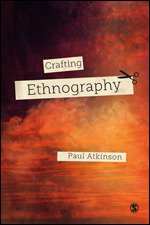
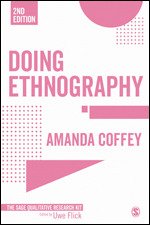
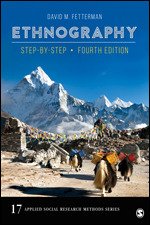
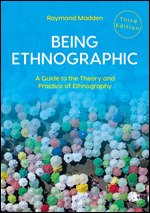
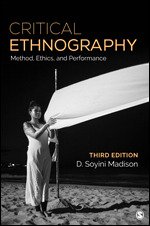
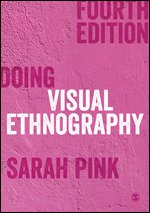
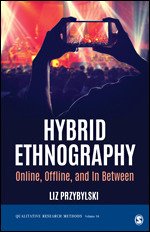
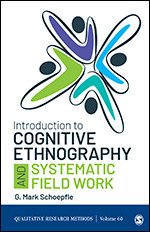
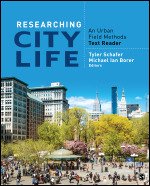




























Learn about connecting the unit of analysis with the qualitative methodology.